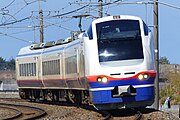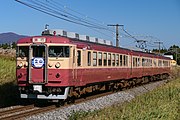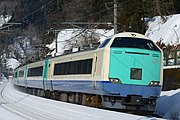Echigo Tokimeki Railway
 | |
Native name | えちごトキめき鉄道株式会社 |
|---|---|
Romanized name | Echigo TOKImeki Tetsudō kabushiki gaisha |
| Company type | Private KK |
| Genre | Rail transport |
| Founded | 22 November 2010 |
| Headquarters | , Japan |
Area served | Niigata Prefecture |
Key people | Tadahiro Shimazu (President) |
| Services | Passenger railway |
| Website | www |
The Echigo TOKImeki Railway Company (えちごトキめき鉄道株式会社, Echigo TOKImeki Tetsudō kabushiki-gaisha) (ETR) is a Japanese third-sector railway operator. It was established in 2010 to operate passenger railway services on the sections of the JR East Shinetsu Main Line and JR West Hokuriku Main Line within Niigata Prefecture when they were separated from the respective JR Group operators in March 2015, coinciding with the opening of the Hokuriku Shinkansen extension from Nagano to Kanazawa. The main shareholders of the company are Niigata Prefecture, the City of Joetsu, the City of Itoigawa, and the City of Myoko.[1]
Lines
[edit]- ■ Myōkō Haneuma Line (37.7 km, Myōkō-Kōgen - Naoetsu)
- ■ Nihonkai Hisui Line (59.3 km, Naoetsu - Ichiburi)
Since 14 March 2015, Echigo Tokimeki Railway operates local passenger operations on two lines: 10 stations on the 37.7 km Myōkō Haneuma Line (妙高はねうまライン) (formerly part of the JR East Shinetsu Main Line) between Myōkō-Kōgen and Naoetsu, and 13 stations on the 59.3 km Nihonkai Hisui Line (日本海ひすいライン) (formerly part of the JR West Hokuriku Main Line) between Naoetsu and Ichiburi.[2]
Myōkō Haneuma Line
[edit]| Myōkō Haneuma Line | |||
|---|---|---|---|
 An ET127 series EMU on the Myōkō Haneuma Line in February 2022 | |||
| Overview | |||
| Native name | 妙高はねうまライン | ||
| Status | Operational | ||
| Owner | |||
| Locale | Niigata Prefecture | ||
| Termini | |||
| Stations | 10 | ||
| Service | |||
| Type | Regional rail | ||
| Rolling stock | ET127 series EMUs E653-1100 series EMUs | ||
| History | |||
| Opened | 15 August 1886 | ||
| Technical | |||
| Line length | 37.7 km (23.4 mi) | ||
| Number of tracks | Single track | ||
| Track gauge | 1,067 mm (3 ft 6 in) | ||
| Electrification | 1,500 V DC Overhead line | ||
| |||
Myōkō Haneuma Line | |||||||||||||||||||||||||||||||||||||||||||||||||||||||||||||||||||||||||||||||||||||||||||||||||||||||||||||||||||||||||||||||||||||||||||||||||||
|---|---|---|---|---|---|---|---|---|---|---|---|---|---|---|---|---|---|---|---|---|---|---|---|---|---|---|---|---|---|---|---|---|---|---|---|---|---|---|---|---|---|---|---|---|---|---|---|---|---|---|---|---|---|---|---|---|---|---|---|---|---|---|---|---|---|---|---|---|---|---|---|---|---|---|---|---|---|---|---|---|---|---|---|---|---|---|---|---|---|---|---|---|---|---|---|---|---|---|---|---|---|---|---|---|---|---|---|---|---|---|---|---|---|---|---|---|---|---|---|---|---|---|---|---|---|---|---|---|---|---|---|---|---|---|---|---|---|---|---|---|---|---|---|---|---|---|---|
| |||||||||||||||||||||||||||||||||||||||||||||||||||||||||||||||||||||||||||||||||||||||||||||||||||||||||||||||||||||||||||||||||||||||||||||||||||
Service outline
[edit]In addition to all-stations "Local" (普通, futsū) services operated by ETR, the line is used by JR East Shirayuki limited express services operating over the section between Jōetsumyōkō and Naoetsu, providing connections with the Hokuriku Shinkansen at Naoetsu,[2] and also by one return "Rapid" service daily operated by the Hokuetsu Express, to and from Echigo-Yuzawa and using the section of the line between Naoetsu and Arai.[3] The Rapid service on only holidays which uses 455 series and 413 series has been commenced operated since 4 July 2021.[4]
Stations
[edit]All stations are in Niigata Prefecture.
| Station | Japanese | Transfers | Location |
|---|---|---|---|
| Myōkō-Kōgen | 妙高高原 | Myōkō | |
| Sekiyama | 関山 | ||
| Nihongi | 二本木 | Jōetsu | |
| Arai | 新井 | Myōkō | |
| Kita-Arai | 北新井 | ||
| Jōetsumyōkō | 上越妙高 | Jōetsu | |
| Minami-Takada | 南高田 | ||
| Takada | 高田 | ||
| Kasugayama | 春日山 | ||
| Naoetsu | 直江津 |
|
Rolling stock
[edit]Local services on the Myōkō Haneuma Line use a fleet of ten ET127 series 2-car electric multiple unit (EMU) trains transferred from JR East.[2] These have reinforced front-end skirts, and feature a new livery.[2] They operate as two- or four-car formation during the off-peak periods, and as six-car formations during peak periods.[2] Shirayuki limited express services operated by JR East use four-car E653-1100 series EMUs.[2]
Since 4 July 2021, Rapid service which uses 413 series and 455 series has been commenced operating on Myoko Haneuma Line on only holidays.
-
An ET127 series EMU, June 2021
-
A Shirayuki E653-1100 series EMU
-
455 series and 413 series EMU which had been used by JR West on Nanao Line since 2020
Nihonkai Hisui Line
[edit]| Nihonkai Hisui Line | |||
|---|---|---|---|
 An ET122 diesel car on the Nihonkai Hisui Line in October 2021 | |||
| Overview | |||
| Native name | 日本海ひすいライン | ||
| Status | Operational | ||
| Owner | |||
| Locale | Niigata Prefecture | ||
| Termini | |||
| Stations | 13 | ||
| Service | |||
| Type | Regional rail | ||
| Rolling stock | ET122 DMUs 485 series (JR), 521 series | ||
| History | |||
| Opened | 1911 | ||
| Technical | |||
| Line length | 59.3 km (36.8 mi) | ||
| Number of tracks | Double track | ||
| Track gauge | 1,067 mm (3 ft 6 in) | ||
| Electrification | 1,500 V DC / 20 kV AC (60 Hz) Overhead line | ||
| |||
Nihonkai Hisui Line | ||||||||||||||||||||||||||||||||||||||||||||||||||||||||||||||||||||||||||||||||||||||||||||||||||||||||||||||||||||||||||||||||||||||||||||||||||||||||||||||||||||||||||||||||||||||||||||||||||||||||||||||||||||||||||||||||||||||||||||||||||||||||||||||||||||||||||||||||||||||||||||||||||||||||||||||||||||||||||||||||||||||||||||||||||||||||||||||||||||||||||||||||||||||||||||||||||||||||||||||||||||||||||||||||||||||||||||||||||||||||||||||||||||||||||||||||||||||||||||||||||||||||||||||||||||||||||
|---|---|---|---|---|---|---|---|---|---|---|---|---|---|---|---|---|---|---|---|---|---|---|---|---|---|---|---|---|---|---|---|---|---|---|---|---|---|---|---|---|---|---|---|---|---|---|---|---|---|---|---|---|---|---|---|---|---|---|---|---|---|---|---|---|---|---|---|---|---|---|---|---|---|---|---|---|---|---|---|---|---|---|---|---|---|---|---|---|---|---|---|---|---|---|---|---|---|---|---|---|---|---|---|---|---|---|---|---|---|---|---|---|---|---|---|---|---|---|---|---|---|---|---|---|---|---|---|---|---|---|---|---|---|---|---|---|---|---|---|---|---|---|---|---|---|---|---|---|---|---|---|---|---|---|---|---|---|---|---|---|---|---|---|---|---|---|---|---|---|---|---|---|---|---|---|---|---|---|---|---|---|---|---|---|---|---|---|---|---|---|---|---|---|---|---|---|---|---|---|---|---|---|---|---|---|---|---|---|---|---|---|---|---|---|---|---|---|---|---|---|---|---|---|---|---|---|---|---|---|---|---|---|---|---|---|---|---|---|---|---|---|---|---|---|---|---|---|---|---|---|---|---|---|---|---|---|---|---|---|---|---|---|---|---|---|---|---|---|---|---|---|---|---|---|---|---|---|---|---|---|---|---|---|---|---|---|---|---|---|---|---|---|---|---|---|---|---|---|---|---|---|---|---|---|---|---|---|---|---|---|---|---|---|---|---|---|---|---|---|---|---|---|---|---|---|---|---|---|---|---|---|---|---|---|---|---|---|---|---|---|---|---|---|---|---|---|---|---|---|---|---|---|---|---|---|---|---|---|---|---|---|---|---|---|---|---|---|---|---|---|---|---|---|---|---|---|---|---|---|---|---|---|---|---|---|---|---|---|---|---|---|---|---|---|---|---|---|---|---|---|---|---|---|---|---|---|---|---|---|---|---|---|---|---|---|---|---|---|---|---|---|---|---|---|---|---|---|---|---|---|---|---|---|---|---|---|---|---|---|---|---|---|---|---|---|---|---|---|---|---|---|---|---|---|---|---|---|---|---|---|---|---|---|---|---|---|---|---|---|---|---|---|---|---|---|---|---|---|---|---|---|---|---|---|---|---|---|---|---|---|---|---|---|---|---|---|---|---|---|---|---|---|---|---|---|---|
| ||||||||||||||||||||||||||||||||||||||||||||||||||||||||||||||||||||||||||||||||||||||||||||||||||||||||||||||||||||||||||||||||||||||||||||||||||||||||||||||||||||||||||||||||||||||||||||||||||||||||||||||||||||||||||||||||||||||||||||||||||||||||||||||||||||||||||||||||||||||||||||||||||||||||||||||||||||||||||||||||||||||||||||||||||||||||||||||||||||||||||||||||||||||||||||||||||||||||||||||||||||||||||||||||||||||||||||||||||||||||||||||||||||||||||||||||||||||||||||||||||||||||||||||||||||||||||
Service outline
[edit]While the western boundary of the Nihonkai Hisui Line is at Ichiburi Station, most services on the line in practice operate between Naoetsu and Tomari on tracks owned by Ainokaze Toyama Railway. At Tomari Station, both ETR trains and Ainokaze Toyama Railway trains use platform 2, allowing a same-platform transfer.[2] The Express service, which uses 455 series and 413 series, runs only on holidays and commenced operations on 4 July 2021, with an additional 500 yen fare required to board.[4]
Stations
[edit]All stations are in Niigata Prefecture.
| Station | Japanese | Transfers | Location |
|---|---|---|---|
| Ichiburi | 市振 | Itoigawa | |
| Oyashirazu | 親不知 | ||
| Ōmi | 青海 | ||
| Itoigawa | 糸魚川 | ||
| Echigo Oshiage Hisui Kaigan | えちご押上ひすい海岸 | ||
| Kajiyashiki | 梶屋敷 | ||
| Uramoto | 浦本 | ||
| Nō | 能生 | ||
| Tsutsuishi | 筒石 | ||
| Nadachi | 名立 | Jōetsu | |
| Arimagawa | 有間川 | ||
| Tanihama | 谷浜 | ||
| Naoetsu | 直江津 |
|
Rolling stock
[edit]The eastern section of the line is electrified at 1,500 V DC and the western section of the line is electrified at 20 kV AC (60 Hz) overhead, with a dead section separating the two different power supplies between Itoigawa and Kajiyashiki stations, but in order to eliminate the need to procure new dual-voltage rolling stock, local services on the Nihonkai Hisui Line use a fleet of eight new ET122 single-car diesel multiple unit (DMU) trains based on the JR West KiHa 122 series design.[2] This fleet includes two special-event cars.[2] Services normally operate as single-car trains during the off-peak periods, increased to two cars during the peaks.[2]
Until March 2017, a seasonal, limited-stop Rapid service, operating between Niigata and Itoigawa, ran once a day in each direction using a 6-car JR East 485 series EMU.[2][5]
Since 4 July 2021, an Express service has been run, operating only on holidays. It uses 413 series and 455 series cars.
-
An ET122 DMU car, June 2015
-
An ET122 DMU special-event car, May 2015
-
A JR East 485 series EMU
-
413 series and 455 series EMU which had been used by JR West on Nanao Line since 2020
History
[edit]The company was founded on 22 November 2010.[1] The new names for the two lines to be operated by the company were announced in June 2012,[6] and the company name was changed to Echigo Tokimeki Railway Company from 1 July 2012.[1] The company was formally granted a railway operating license by the Ministry of Land, Infrastructure, Transport and Tourism on 28 February 2014.[7]
Resort train
[edit]
A two-car ET122-1000 series diesel multiple unit resort train entered service from 23 April 2016, operating over both of the ETR lines.[8] The two-car diesel train is branded Setsugekka (雪月花, lit. "Snow, Moon, Flowers").[9]
See also
[edit]- List of railway companies in Japan
- List of railway lines in Japan
- Shinano Railway, a third-sector railway company in neighbouring Nagano Prefecture
References
[edit]- ^ a b c 会社概要 [Company overview] (in Japanese). Japan: Echigo Tokimeki Railway Company. 2011. Archived from the original on 19 March 2014. Retrieved 19 March 2014.
- ^ a b c d e f g h i j k Osano, Kagetoshi (March 2015). 北陸新幹線並行在来線各社の姿 [Guide to companies operating conventional lines alongside the Hokuriku Shinkansen]. Tetsudō Daiya Jōhō Magazine (in Japanese). Vol. 44, no. 371. Japan: Kōtsū Shimbun. pp. 28–33.
- ^ 北越急行 えちごトキめき鉄道に乗入れ [Hokuetsu Express to inter-run over Echigo Tokimeki Railway]. Tetsudo Hobidas (in Japanese). Japan: Neko Publishing Co., Ltd. 19 February 2015. Archived from the original on 20 February 2015. Retrieved 20 February 2015.
- ^ a b About Rapid and Express service
- ^ 2017年3月ダイヤ改正について [Timetable revision in March 2017] (PDF) (in Japanese). Japan: Echigo Tokimeki Railway Company. 2016. Retrieved 18 December 2017.
- ^ 並行在来線会社名・路線名の候補が決定しました [Names decided for operating company and lines] (PDF) (in Japanese). Japan. 22 June 2012. Archived from the original (PDF) on 19 March 2014. Retrieved 19 March 2014.
- ^ しなの鉄道(株)、えちごトキめき鉄道(株)、あいの風とやま鉄道(株)及びIRいしかわ鉄道(株)申請の第一種鉄道事業許可について [Details of railway business approval for Shinano Railway, Echigo Tokimeki Railway Company, Ainokaze Toyama Railway, and IR Ishikawa Railway]. News release (in Japanese). Japan: Ministry of Land, Infrastructure, Transport and Tourism. 26 February 2014. Retrieved 19 March 2014.
- ^ リゾート列車(観光列車)愛称名募集 [Invitation to name new resort train]. Echigo Tokimeki Railway (in Japanese). January 2015. Archived from the original on 12 February 2015. Retrieved 12 March 2015.
- ^ ET122形1000番台「雪月花」が甲種輸送される [ET122-1000 series "Setsugekka" delivered]. Japan Railfan Magazine Online (in Japanese). Japan: Koyusha Co., Ltd. 25 March 2016. Retrieved 25 March 2016.
External links
[edit]- Official website (in Japanese)









